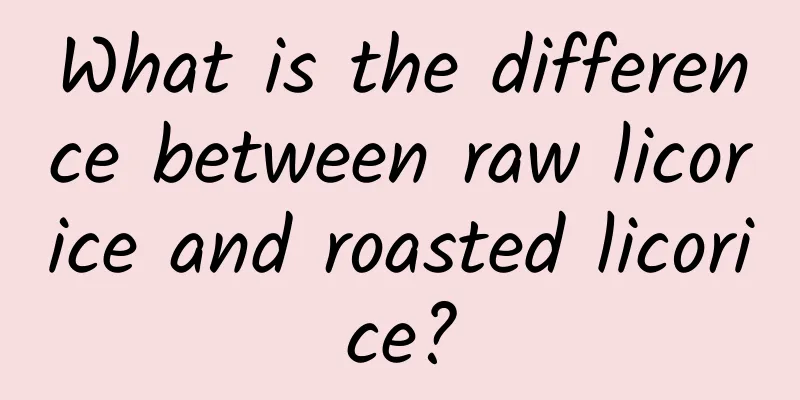What is the difference between raw licorice and roasted licorice?

|
Licorice is a kind of Chinese herbal medicine, which is divided into raw licorice and roasted licorice. Many people are not clear about the relationship between the two. In fact, raw licorice and roasted licorice are both kinds of licorice, but the processing methods are different. In addition, due to different processing methods, their medicinal properties and effects will also be different. Licorice is a tonic Chinese herbal medicine, and the medicinal parts are mostly roots or rhizomes. Let's take a look at the differences between raw licorice and roasted licorice. Raw licorice: sweet, neutral. Heart, lung, spleen, stomach meridians . Its functions and indications are: tonifying the spleen and replenishing Qi, clearing away heat and detoxifying, removing phlegm and relieving cough, relieving acute pain and harmonizing various medicines. It is used for spleen and stomach weakness, fatigue, palpitations and shortness of breath, cough with excessive sputum, cramps and pain in the abdomen and limbs, carbuncles and sores, and to relieve the toxicity and potency of drugs. Roasted licorice is also known as roasted licorice, honey licorice, and honey-roasted licorice. Mix raw licorice slices with honey, stir-fry until they are no longer sticky, take them out and spread them out to dry, and then use them as medicine. It is more inclined to moisten the lungs and harmonize the middle. Roasted licorice can nourish the spleen and replenish qi. It is used in large quantities in clinical practice and is exported in large quantities. In addition to its medicinal uses, licorice is also used extensively as a pastry additive in food. Its sweetness is 100 times that of sucrose. In addition, let me introduce the famous Licorice Soup. Licorice Decoction is a soup made with roasted licorice as the main ingredient. It originated from "Treatise on Febrile Diseases" by Zhang Zhongjing in the Han Dynasty. The original text says: "For febrile diseases with knotty and intermittent pulse and palpitations, Zhigancao Decoction is the main treatment." It is composed of roasted licorice, ginger, cinnamon twig, ginseng, raw rehmannia, donkey-hide gelatin, Ophiopogon japonicus, hemp seed, jujube, and sake. Indications: valvular heart disease, arrhythmia, endocarditis, anemia, sympathetic nervous system disorder, hypertension, hyperthyroidism. In terms of similarities, both are tonic Chinese medicines that have the effects of replenishing qi and blood and regulating yin and yang. Licorice is known as the king of herbs. Its medicinal effect is very good. It is also often used in life as a medicine for relieving cough and asthma, clearing heat and moistening the lungs. At the same time, it also has a good regulating effect on the kidneys. The above is about the difference between raw licorice and roasted licorice. I hope it will be helpful to you. |
<<: What are the effects of Schisandra chinensis and Licorice?
>>: What are the benefits of lettuce seeds and cucumber seeds
Recommend
What are the effects of traditional Chinese medicine Shouwu
Polygonum multiflorum is favored by many people d...
What pots and containers can be used to bake delicious sweet potatoes?
Imagine that when we get off work and walk out of...
Attention! What you think is a callus may actually be a viral infection!
You may have heard of calluses and corns, but do ...
Every bite you eat is responsible for your brain
After the various fatty acids in food enter the h...
Why can an eraser erase pencil marks?
Pencils and erasers are both convenient stationer...
Side Effects of Rhodiola Rosea
The side effects of Rhodiola rosea include gastro...
Unveiling the true colors of the starry sky: Why do Uranus and Neptune, which are so similar, have such different colors?
Author: Duan Yuechu Uranus and Neptune are among ...
What are the effects of Lu Codonopsis pilosula
The medicinal material Lu Codonopsis is a more co...
Eating too much of this kind of meat can lead to cardiovascular disease and diabetes! Check whether you are eating it right?
Nowadays, cardiovascular disease can be regarded ...
The efficacy and function of Polygonum convolutum
Polygonum convolvulus is something that many peop...
Stones that look like leeches after heating may sound scary, but they are actually a great help in building construction →
Yu Feng Recently, the State Council issued the &q...
Which is more hygienic, drying clothes in the sun or drying them in a tumble dryer?
Winter is here again. I believe many people are l...
The efficacy and function of velvet leaves
Ramie leaf is a wild plant, but it can also be us...
Are projectors really better for your eyes than TVs? Before buying a projector, just know these 3 things!
There are so many projectors on the market now, n...









